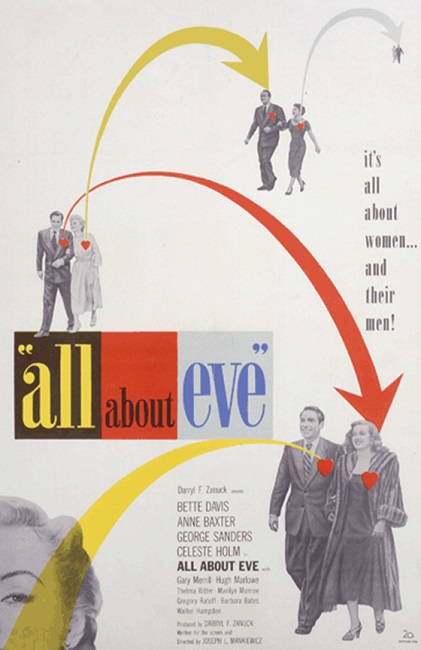
All About Eve – 1950
The 1950 winner of the Academy Award Best Picture is a wonderful film starring Bette Davis, Anne Baxter, George Sanders, Celeste Holm, Gary Merrill, and Hugh Marlow. Already, we have a pretty good cast of actors. Bette Davis, of course, is well known as an incredibly accomplished actress with a film career that lasted from her debut in 1931’s The Bad Sister, to her final appearance in 1987’s The Whales of August. Fifty-six years! She had under her belt, ten Academy Award nominations, two of which she won. What an incredible career!
But the rest of the cast, although not as well known today, was quite well known in 1950. Celeste Holm, you may remember, won the Best Supporting Actress award for her part in Gentleman’s Agreement. George Sanders was a great British actor who was in over 130 films between 1929 and 1972. I mention these two because they did a particularly fine job in All About Eve. Their roles were very different and they performed them with what seemed like ease and skill.
Contained in this film is a very famous line spoken by Davis. Her character, Margo Channing, is a highly respected and well-loved actress who is at the peak of her career, though she is getting too old for the young roles she plays on stage. She is at her lover’s birthday party and she has seen her man, Bill Sampson, played by Gary Merrill, talking to the young and beautiful Eve Harrington, played by Anne Baxter. She is just beginning to suspect that Eve’s mysterious adoration and ambition might be some kind of a creepy threat. She assumes the worst and begins downing martinis like they were water, turning herself into a vicious woman who casually throws around incredibly witty insults at anyone in range. Upon hearing some icy comment from Margo, her best friend Karen Richards, wonderfully played by Celeste Holm asks something like, “So, Margo, are you finishing up, or are you just getting started?” Margo walks away from the conversation, but turns around long enough to deliver that famous line, “Fasten your seatbelts, it’s going to be a bumpy night!” What a great line!
Her co-stars all did a great job as her supporting cast, but really, Davis was the real scene stealer. She seemed to draw my attention. Maybe it was her attitude, her poise, or her unconventional good-looks. Maybe it was her famous eyes that made me focus on her. Maybe it was the mystique of a diva-like actress with such a big name. Whatever it was, she had a presence about her that made her a pleasure to watch. She really did command my attention.
With one exception. Even Bette Davis had to give up the spotlight when it came to a bit part played by an actress that was not well known at the time. Playing the minor role of Claudia Caswell, a hopeful but slightly air-headed young actress, whom the character of DeWitt described as a “graduate of the Copacabana School of Dramatic Arts”, was Marilyn Monroe. She had such a small part but she milked it like you wouldn’t believe! As hard as I tried, I couldn’t keep my eyes off of her. Her lines were delivered in such a way as to make her tiny, one-dimensional character fascinating and captivating, charming and memorable. The camera really did love Monroe.
Interesting note: This was Monroe’s eighth film appearance. The inexperienced Monroe was cowed by Bette Davis, and took 11 takes to complete the scene in the theatre lobby with the star. When Davis barked at her, Monroe left the set to throw up.
But back to the film. The plot was an interesting one that gave the audience a glimpse into the fictionalized lives of the rich and beautiful. It had sophistication, style and glamor. Add to that a touch of creepy and razor sharp wit, and you have a delightful film. It is always interesting to hear insults which are thinly disguised as compliments. It is an indication of very clever writing.
In the title role of Eve Harrington, Baxter actually made you believe her lies which made the big reveal in the end that much more satisfying to watch. You see, her whole goal was to steal Margo’s entire life – her career, her success, her money, and yes, even her lover. However, fortunately for Margo, Sanders’ character, Broadway critic, Addison DeWitt, was the first one to definitively see through Eve’s falsehoods. And being the cold-hearted and vicious man he was, he used them to his advantage. The scene in which he confronted Eve and told her in no uncertain terms that because he knew all her dirty little secrets, he owned her, even going so far as to slap her into submission. That was especially satisfying to watch! At that point in the film, you see just how low and evil Eve really is, and it was nice to see her finally get put in her place.
The final scene was also interesting to watch. As the now successful actress, Eve, returns to her hotel after receiving a prestigious award, a star-struck and adoring fan has crept into her room. She begins to show behavior that seems disturbingly similar to Eve’s own behavior at the beginning of the film.
All that being said, it was nice to get back to a film that did not have, for lack of a better term, a specific agenda. Movies like Mrs. Miniver, The Lost Weekend, The Best Years of Our Lives, Gentleman’s Agreement, and All the King’s Men had their own agendas. Whether it was to address a social issue, explore a difficult subject, or show support for a war effort, these films had an agenda that had a specific purpose and were trying to effect some kind of change in those who watched them. But All About Eve had no such designs on its audiences. It was just a cleverly written fictional story that was well acted and fun to watch. I didn’t feel like I was being educated or like I was suddenly being expected to do something from having watched the film. And it didn’t take itself too seriously. It had both dramatic and reflective scenes and brief moments of light-hearted comedy.
Interesting note: Davis apparently read the script in one sitting and immediately accepted the role, knowing that the film would be a winner. The role of Margo Channing is widely considered one of the best performances of Bette Davis’ career, and though both she and Anne Baxter were nominated for Best Actress, neither of them won the award.
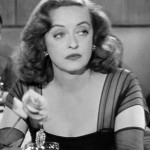
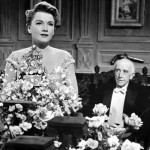

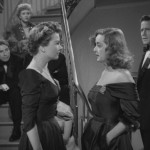
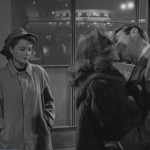
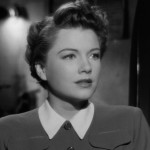
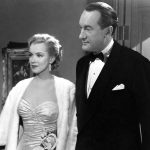
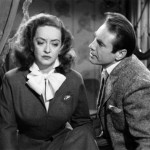
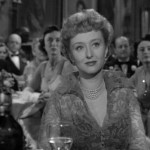
Best movie ever…just sayin!